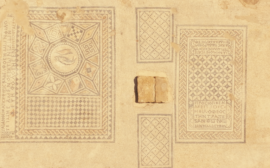By: Daniel Merritt, Ph.D., Th.D. | April 21, 2022
Editorial Note: We give our readers the opportunity to ask questions of our staff concerning theology, apologetics, philosophy, and the Bible. Some of the questions are answered on the podcast, whereas others are addressed in articles. If you have a question that you would like to ask the Bellator Christi Team, go to https://bellatorchristi.com/submit-a-question-to-bellator-christi/ and fill out the form. Your question could be featured in a future article on BellatorChristi.com or an episode of the Bellator Christi Podcast.
Question: “Did Jesus break the Sabbath in John 5:18? Or was the Sabbath not applicable to Him the way it would have been for others (since Jesus is God)? -Anonymous1.
Answer: In John 5 one finds a puzzling statement that seems to suggest that Jesus broke the Sabbath law. Upon healing a man at the pool of Bethesda on the Sabbath (John 5:1-15), Jesus’ actions stirred intense anger amongst the Pharisees. John 5:18 reads, “Therefore the Jews sought the more to kill him because he not only had broken the Sabbath, but said also that God was his Father, making himself equal with God” (KJV). Now if Jesus broke the Sabbath law in John 5, he also broke it on several other occasions when he healed individuals on the Sabbath. Jesus healed on the Sabbath Simon Peter’s mother-in-law (Mark 1:29–31), the man with a withered hand (Mark 3:1–6), the man born blind (John 9:1–16), a crippled woman (Luke 13:10–17), a man with dropsy at a Pharisee’s house (Luke 14:1–6), a demon-possessed man in Capernaum (Mark 1:21–28), and the incident before us in John 5.
We know from Scripture that Jesus fulfilled the Law of God perfectly in all areas while on earth. He never violated one jot or tittle of God’s perfect Law, which would have included keeping the instructions involving observance of the Sabbath (Matthew 5:17-19). Before giving a more detailed explanation, a short answer to whether or not Jesus broke the Sabbath law is that Jesus did not break the Sabbath law but only the Pharisee’s interpretation of what was meant by Sabbath-keeping.
Context of John 5
As Jesus was in Jerusalem, he passed by the pool of Bethesda. The Master’s compassionate eyes spotted a man who had been lame for thirty-eight years. He was destined to spend his days hoping for a miracle. Jesus commanded the man to take up his bed and walk, which the man did. The fact that Jesus healed the man on the Sabbath, so infuriated the Pharisees they begin to “persecute Jesus and sought to kill him, because he had done these things on the Sabbath day” (John 5:16). To add fuel to the fire, in Jesus’ subsequent discussion with the Pharisees on his healing on the Sabbath, the Jews were enraged even further as they interpreted some of Jesus’ remarks as making himself equal with God. So Jesus had two accusations hurled at him: that he had broken the Sabbath law by healing on the Sabbath and blasphemy because he had made himself equal with God (John 5:18). While Jesus is equal with God, the question before us is how should the accusation that Jesus broke the Sabbath law be understood?
The Purpose of Sabbath-Keeping
When God gave Moses the Ten Commandments he gave the Israelites clear instructions in regard to observing and honoring the Sabbath. On the Sabbath the Jews were to rest, remembering that in six days the universe was created by God and that on the seventh day he rested. The Sabbath was not to be a burden, but (1) was to be a sign of the Mosaic Covenant (Ex. 31:13), (2) a time when the people were to focus on their relationship with God and after a busy week of working, engage in a time of reflection upon the Father’s love, mercy and bountiful blessings to His people, and (3) was a picture of the coming rest of salvation found in the promised Messiah and a future rest in Heavenly Canaan (Hebrews chapters 3 and 4). God gave specific instructions in the Torah how the Sabbath was to be observed. The Sabbath was for the purpose of benefiting the people, not to be a burden. However, as the years went by, the religious leaders sought to expand upon the instructions of God regrading Sabbath-keeping, until the focus was no longer on one’s relationship with God and his fellow man but one’s relationship to keeping burdensome man-made traditions and rules.
The Pharisees and Sabbath-Keeping
By the time of Jesus, Sabbath-keeping was a cumbrance burden rather than being a benefit in the aid of drawing one closer to the Lord and giving rest to one physically, emotionally, and spiritually. To clarify the instructions in the Torah, the Jewish religious leaders created thirty-nine separate categories of what was involved in “correct” Sabbath observance. Within those thirty-nine categories there were many sub-categories. In regard to observing the Sabbath the Mishnah lists these thirty-nine kinds of labor that were not allowed on the Sabbath. [1] The first eleven dealt with the producing and preparing of bread: sowing, plowing, reaping, binding sheaves, threshing, winnowing, selecting, grinding, sifting, kneading, and baking. The next twelve dealt with the steps in the preparation of making clothing, from the shearing of sheep to the sewing of the garments. These were followed by seven steps in preparing a deer for use as food or for leather. Then followed instructions dealing with writing, building, kindling, extinguishing of fires, and how far one could journey on the Sabbath.
The man-made traditions were oppressive upon the people. A few examples from hundreds and hundreds of these oppressive “laws” will reveal their burdensomeness. The writing under a painting or an image was not to be read on the Sabbath, for it might result in one turning to idols. [2] Mud on a person’s clothing could be crushed by a person’s hand and then shaken off, but it could not be rubbed out of the garment. [3] One could look into a mirror on the Sabbath if it was fastened to a wall, but one could not look into metal mirror not fastened to a wall because one usually removes straggling hairs with it. [4] One may not close the eyes of dead person on the Sabbath. [5]
In regards to healing on the Sabbath, a person could receive medical attention if there were danger to the person’s life; otherwise healing would have to wait until another day other than the Sabbath.[6] Thus the problem with Jesus healing the man at the pool of Bethesda on the Sabbath; for since the man had been there so long and his life was not in danger, the Pharisees contended his healing could have waited until the next day!
Jesus and the Law
It has already been established from Jesus’ words in The Sermon on the Mount that he came to fulfill every jot and tittle of the Law. Craig Keener states it well, “The claim that Jesus broke the law is not his but that of his opponents.” [7] It is seems clear that the charge brought against Jesus that he had broken the Sabbath law, is not a comment by the Apostle John, but is rather an accusation brought by the Jews against Jesus for breaking their man-made traditions. While Jesus may have broken the Sabbath as was interpreted and understood by the legalistic Pharisees, he did not break the Sabbath as was intended by God. The Pharisees had taken what was meant for good, and made it a burden to where human needs could not be met and compassion extended. Francis Moloney writes the Jews were “correct in suggesting that Jesus broke their understanding of the Law. Jesus is not abolishing the Sabbath; he is reinterpreting it in terms of his relationship to the Father.”[8] Jesus sought to elevate the law to a new level and demonstrate to the Jews the spirit of the Law which they had forgotten…love toward God and one’s fellow man. The Sabbath was given by God to benefit people and to glorify God. The Pharisees did just the opposite. Their man-made traditions stifled a vital relationship with God and blinded them to compassion needed for their fellowman. In Jesus disregarding their Sabbath traditions and understanding of Sabbath-keeping, he fulfilled the Sabbath law by meeting human need with divine compassion and bringing glory God.
About the Author
 Dr. Merritt is no stranger to Bellator Christi. He has been featured as a guest contributor on the website for many articles, including one of his biggest hits, “Voltaire’s Prediction: Truth or Myth,” before joining Bellator Christi as a regular contributor. Dr. Merritt received both a Ph.D. and a Th.D. and has studied theology, philosophy, and biblical studies at North-Western Theological Seminary, Southeastern Baptist Theological Seminary, and Campbell University. Dr. Merritt has published such books as Writings on the Ground and Dealing Effectively with Church Conflict. Merritt serves as the Director of Missions for the Surry Baptist Association after serving numerous churches in northwestern North Carolina. He also teaches and directs the Seminary Extension of the Southern Baptist Convention in the Mount Airy, NC area. In his spare time, Merritt serves as a track coach, training the next generation of runners.
Dr. Merritt is no stranger to Bellator Christi. He has been featured as a guest contributor on the website for many articles, including one of his biggest hits, “Voltaire’s Prediction: Truth or Myth,” before joining Bellator Christi as a regular contributor. Dr. Merritt received both a Ph.D. and a Th.D. and has studied theology, philosophy, and biblical studies at North-Western Theological Seminary, Southeastern Baptist Theological Seminary, and Campbell University. Dr. Merritt has published such books as Writings on the Ground and Dealing Effectively with Church Conflict. Merritt serves as the Director of Missions for the Surry Baptist Association after serving numerous churches in northwestern North Carolina. He also teaches and directs the Seminary Extension of the Southern Baptist Convention in the Mount Airy, NC area. In his spare time, Merritt serves as a track coach, training the next generation of runners.
NOTES
[1] Shabbath 7.2, Soncino ed. of the Talmud, pp. 348, 349.
[2] Ibid, 65.
[3] Ibid, 16-18.
[4] Ibid, 16.
[5] Ibid, 13.
[6] Ibid, 77,
[7] Craig S. Keener, The Gospel of John: A Commentary, two volumes (Peabody: Hendrickson Publishers, 2003), 1:646.
[8] Francis J. Moloney, “The Gospel of John,” Sacra Pagina, Vol. 4 (Collegeville: The Liturgical Press, 1998), 174.
© 2022. BellatorChristi.com.






[…] Did Jesus Break the Sabbath Law in John 5:18? […]